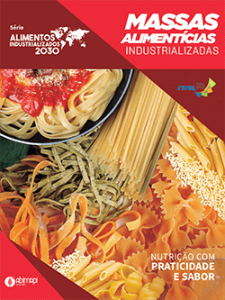INDUSTRIALIZED DOUGHS NUTRITIONAL VALUE
Historically, doughs are recognized as part of the basic feeding in many countries, due to its nutritive value and gastronomic versatility for meals that fosters family and social interaction. From the nutritional point of view, the nutrients composition and energy value vary significantly among the different types of dough and the ingredients used in its formulation. There are reasonable differences among dry, instant, and refrigerated doughs.
In the sample of 269 products, based on the nutritional label, the quantities of nutrients of mandatory statement were tabulated: Proteins, Fibers (dietary fiber), Calories (energy value, Kcal), Carbohydrates, Saturated fats, Trans fat and Sodium.
PROTEINS
Doughs contribute with significant quantities of PROTEINS for the consumers feeding and nutrition. Based on the Anvisa Normative Instruction IN no. 75, from October 8th, 2020, generally, 95.9% of products can be considered as SOURCE of proteins and 66.2% as having a HIGH CONTENT of proteins, per portion of 100 g.
DIETARY FIBER
Doughs contribute with significant quantities of DIETARY FIBERS for the consumers feeding and nutrition. Based on the Anvisa Normative Instruction IN no. 75, from October 8th, 2020, 138 products (51.3% of the sample) can be considered as SOURCE of FIBERS and 25 products (9.3% of the sample) as having a HIGH CONTENT of FIBERS, per portion of 100 g.
CALORIES (ENERGY VALUE)
Generally, doughs are not products with low ENERGY VALUE as they are compound of wheat, sugar, oils and fat. However, the quantities of calories vary significantly among the analyzed products. As observed in the chapter on market trends, products have been developed with reduced energy value, with ingredients reformulation and fats reduction. Among the alternatives to reduce calories, there are thinner doughs, plant-based dough, less caloric fillings, smaller portions.
CARBOHYDRATES
Generally, doughs, industrialized or not, are usually products rich in CARBOHYDRATES, considering the ingredients contained in it. However, according to the type, the quantities vary significantly among the products.
SATURATED FATS
Generally, doughs are not products of low saturated fat. However, the quantities of SATURATED FATS in the doughs vary significantly according to the ingredients present in their formulation. Among the alternatives to reduce saturated fats, there are the mixtures or fillings with more vegetables, meat, and less fatty or its replacement for similar products.
TRANS FAT
The quantities of TRANS FAT in hamburgers vary significantly according to the ingredients present in their formulation. Most doughs analyzed have a statement of exemption of trans fat.
SODIUM
Generally, salt is a basic ingredient to make doughs, their fillings and seasonings. However, the quantities of SODIUM the doughs vary significantly according to the ingredients present in their formulation. Among the alternatives to reduce sodium there are lower addition of salt in the dough, use of substitutive ingredients, etc.




